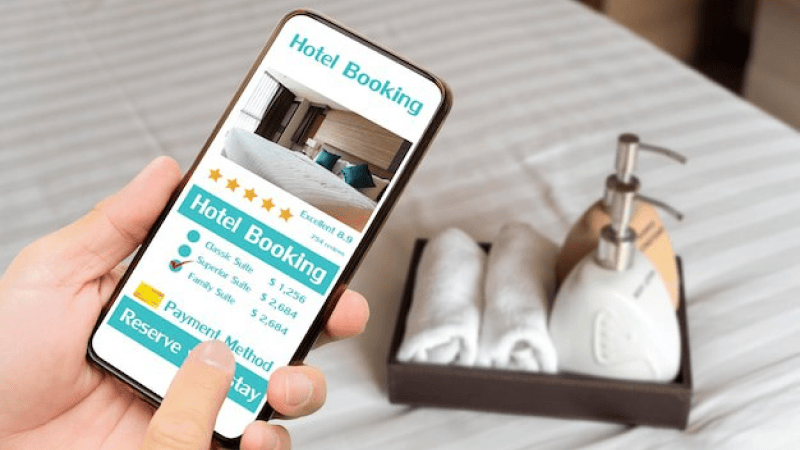Boosting User Experience: A Comprehensive Approach to Testing a Hotel Booking App

The success of hotel booking apps hinges significantly on user experience (UX). As travelers increasingly rely on these tools for convenience, it's not just about functionality but the overall feel and response users have when interacting with the app.
A top-notch UX, defined by intuitive design, speed, relevant content, and reliability, can differentiate a frequently-used app from one that's quickly discarded. This includes everything from clear navigation to quick load times, secure payments, and tailored hotel options.
In a competitive market, where users are flooded with choices, it's the UX that often becomes the deciding factor. A superior UX not only boosts customer satisfaction but also ensures the app's long-term success through positive reviews and user retention.
Challenges in Hotel Booking Apps

Hotel booking apps, despite their convenience, face a myriad of challenges that can hinder their performance and user satisfaction.
One of the primary issues is usability. An app might have all the necessary features, but if users find it difficult to navigate or understand, or find what they're looking for, they're likely to abandon it.
Payment glitches are another significant concern. Users expect a seamless and secure transaction process, and any hiccup, be it due to software issues or integration problems with payment gateways, can lead to lost sales and trust.
The search functionality is crucial in these apps. Users want accurate, fast results tailored to their preferences. If the search algorithm isn't optimized or lacks filters, users might get overwhelmed or miss out on the best deals.
Other challenges include inconsistent content display, lack of personalization, and slow load times.
Importance of Testing in Enhancing User Experience
Testing plays a pivotal role in refining hotel booking apps. By identifying usability issues, developers can make necessary adjustments to improve intuitiveness and ease of use.
It's not just about individual features but testing the entire user journey—from opening the app, searching for hotels, making a selection, processing payment, to receiving booking confirmation.
This end-to-end testing ensures that users don't encounter obstacles at any stage. Comprehensive testing also helps in optimizing search algorithms, ensuring payment integrations work flawlessly, and verifying that content is displayed consistently across devices.
Some common testing methods include usability testing, where real users interact with the app and provide feedback, and A/B testing, where two versions of a feature are compared to determine which one performs better.
Rigorous testing ensures that hotel booking apps deliver on their promise of convenience and reliability, leading to enhanced user satisfaction.
Comprehensive Approach to Testing a Hotel Booking App

Pre-planning Phase
Before diving into the actual testing, it's crucial to lay a solid foundation. This involves:
- Defining Testing Objectives and Goals: Clearly outline what you aim to achieve with the testing. This could range from identifying usability issues to ensuring the app works seamlessly across various devices.
- Establishing Target User Groups and Personas: Recognize the diverse users of the app. Whether it's a leisure traveler looking for a weekend getaway, a business traveler on a tight schedule, or a group planning a long vacation, each segment has unique needs. By establishing these personas, you can ensure the app is intuitive and user-friendly for all.
Testing During the Development Phase
As the app takes shape, rigorous testing ensures it meets the desired standards:
- Usability Testing: Engage real users to navigate the app, ensuring intuitive design and functionality.
- Performance Testing: Assess the app's speed and responsiveness, ensuring users don't experience lags or crashes.
- Compatibility Testing: Ensure the app functions seamlessly across various devices, platforms, and browsers. This is crucial given the diverse range of devices and screen sizes that users might employ.
- Segmented User Testing: Engage actual users from different segments (leisure travelers, business travelers, groups) to ensure the app caters to their specific needs and preferences.
- Localization and Global Accessibility: As hotel booking apps cater to a global audience, it's essential to ensure the app is localized for different regions and languages. This involves not just translation but also cultural nuances and preferences.
- Payment Gateway Testing: Given the financial transactions involved, it's crucial to ensure that payment gateways are secure, reliable, and user-friendly. Engaging crowd testers can provide insights into real-world transaction scenarios.
- Accessibility Testing: Ensure the app is compliant with ADA guidelines, making it accessible to users with disabilities.
Post-launch Testing and Continuous Improvement
Even after the app's launch, the testing doesn't end:
- Gathering User Feedback: Actively collect feedback from users, understanding their pain points and areas of delight.
- Analyzing App Reviews: Monitor app store reviews to gauge user sentiment and identify areas for improvement.
- Analyze the Support Process: Understand the common issues users face and reach out to the support team for, ensuring continuous refinement of the app based on these insights.
Hotel Booking App and Crowd Testing

Hotel booking apps play a crucial role in the life of an average traveler. The app’s user experience can make or break success. And crowd testing is a game-changer.
Here's why this union is a match made in digital heaven:
- Diverse User Base: Hotel booking apps cater to a global audience with varied preferences, devices, and cultural nuances. Crowd testing, by its very nature, involves a diverse group of testers from different backgrounds, locations, and device ecosystems. This ensures that the app is vetted from multiple perspectives, closely mirroring its actual user base.
- Real-world Scenarios: Unlike lab environments, crowd testing offers insights into how the app performs in real-world conditions. Whether it's varying internet speeds, different mobile devices, or unique user behaviors, crowd testing captures it all.
- Rapid Feedback Loop: With a multitude of testers simultaneously using the app, feedback is swift and comprehensive. This allows developers to quickly identify and rectify issues, ensuring a smoother user experience.
- Cost-Effective: Maintaining an in-house testing team with the diversity and scale of a crowd is expensive. Crowd testing offers a more economical solution without compromising on the breadth or depth of testing.
- Payment Gateway Insights: Given the financial transactions in hotel booking apps, it's crucial to ensure seamless and secure payments. Crowd testers, spread across different regions, can execute payment testing and provide valuable insights into regional payment gateways, real credit card transactions, currency conversions, and local banking integrations.
- Localization Expertise: Crowd testers from different parts of the world can offer feedback on the app's localization, ensuring that translations are accurate, culturally sensitive, and region-appropriate.
- Continuous Improvement: Post-launch, crowd testers can continue to provide feedback on updates, new features, and evolving user needs, ensuring the app remains top-notch and relevant.
- Streamlined Testing Management: Benefit from a dedicated project manager who oversees the entire testing cycle. Serving as your single point of contact, they ensure seamless communication, from test planning to bug resolution. This minimizes customer management overhead, letting you focus on delivering an exceptional hotel booking app.
Conclusion
Today, the competition is fierce and user expectations are sky-high. Delivering an impeccable user experience is a necessity. While various testing methodologies play their part, the role of crowd-testing stands out as particularly transformative.
Crowd testing, with its diverse pool of testers from various backgrounds and regions, offers insights that traditional testing methods might overlook. It captures the essence of real-world scenarios, ensuring that the app resonates with its global audience. From understanding cultural nuances in localization to ensuring the robustness of payment gateways across different regions, crowd testing provides a holistic view of the user experience.
Moreover, the rapid feedback loop inherent in crowd testing allows for swift iterations, ensuring that issues are not just identified but rectified promptly. This agility is invaluable in the fast-paced digital world, where user preferences and technological landscapes evolve rapidly.
Ultimately, an app's success is measured by its users' satisfaction. And satisfaction stems from a seamless, intuitive, and reliable user experience. By leveraging crowd testing, hotel booking apps can elevate their user experience to unparalleled heights, leading to increased customer loyalty, positive word-of-mouth, and sustained business success. In the journey of creating a standout hotel booking app, crowd testing emerges not just as a tool but as a strategic ally.
Want to know more? Contact us at sales@ubertesters.com for more details.

